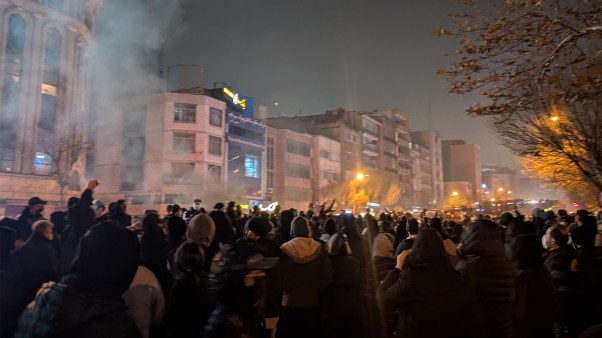A guide for citizens of two kingdoms.
“Oh lord, help our President, as he carries out the heavy responsibilities of his office. Give him wisdom, strength, and endurance. Lord, help our governor and mayor as well.”
Prayers like these are frequently included in our worship services, prayer meetings, and family devotions in keeping with the instructions in 1 Timothy 2:1–4: “I urge, then, first of all, that requests, prayers, intercession and thanksgiving be made for everyone—for kings and all those in authority.” The apostle Paul went on to explain why he singled out the rulers for special mention: “That we may live peaceful and quiet lives in all godliness and holiness. This is good, and pleases God our Savior, who wants all men to be saved and to come to a knowledge of the truth” (NIV).
In Paul’s time, as today, kings, emperors, and governors exercised a great deal of control over the human and physical environment affecting the advancement of the gospel. Paul was not suggesting a selfish and parochial prayer. He was not saying that we should pray only that our evangelism and church planting not be hindered. He wrote with a keen awareness that the power of emperors and governors was the power to dramatically affect human lives, to oppress or to liberate, to persecute or to bless.
Unfortunately, Paul gave us only the “why” of praying for those in authority, not the “how.” There are numerous other New Testament passages dealing with the relationship of believers to the government, directing us to respect, honor, and obey the rulers. But there is very little teaching about how we should pray for these officials. For this we need to turn to the Old Testament, where we find helpful guidelines for the content of the prayers. We also find direction for those situations in which we cannot in good conscience pray for the longevity and prosperity of the ruler—when in fact it becomes clear in praying for them that we must, with some reluctance, begin praying against them.
Praying For Leaders
The model for the citizen praying for the ruler is found in Psalm 72, a prayer that contains more than a hint of the coming great King, Jesus Christ. As is typical of Hebrew literature, however, the psalm has equal force and relevance at its other levels of meaning, having to do with the reigns of David and his son Solomon, and the rulers of today as well. Psalm 72 is specific and relevant enough to be used as an outline for our praying, filling in the names of our president, governor, members of Congress, and mayor.
Three themes in this passage shape the agenda of our praying:
1. Righteousness and justice. The first two verses of the chapter use a pair of concepts that together account for a great body of teaching on God’s standards for human governments. The two words are often used interchangeably in the Old Testament, as in verse 2, “He will judge your people in righteousness, your afflicted ones with justice.” In verses 4 and 12–14, the psalmist defines justice and righteousness by indicating how it shapes the activities of the ruler:
“He will defend the afflicted among the people and save the children of the needy; he will crush the oppressor.… For he will deliver the needy who cry out, the afflicted who have no one to help. He will take pity on the weak and the needy and save the needy from death. He will rescue them from oppression and violence, for precious is their blood in his sight” (NIV).
Do we have people who are afflicted, needy, oppressed, and victims of violence today? Of course we do; their numbers literally reach into the millions. Do our rulers care about the oppressed? In some cases, yes; in too many cases, emphatically not. The political scientist will tell you that government and politics operate with, one common ingredient, power. From Machiavelli to Idi Amin, those who have risen to the top in government have normally done so by mastering the art of exercising power. But the psalmist is talking about those who have no power. They have nothing to give in exchange for the help they need. In most cases they have no vote to cast to determine who will be given power and how it will be restrained.
Christ used a quarrel among his disciples as an opportunity to comment on the abuse of power so common among the rulers of the day. As he said, it was the very essence of being in authority to “lord it over” the people, which is another way of describing what was troubling the psalmist: oppression of the people and failure to use power as a corrective to relieve their suffering. Characteristically, Christ turned the prevailing ethic upside-down for those who would follow him: “But you are not to be like that. Instead, the greatest among you should be like the youngest, and the one who rules like the one who serves” (Luke 22:26, NIV). The verbs in Psalm 72 fit very nicely alongside the word serve that Christ used. How should we pray that the ruler will serve? That he will defend, save, deliver, rescue, and take pity on the oppressed and needy.
Power operates on the “quid pro quo” principle. I will help you if I perceive that you will be able and willing to help me in return. The ethics of justice and righteousness are the opposite. I will help you regardless of the benefits I might receive in return. I will help you regardless of your political party, your ancestry, and your wealth. I will help you without any thought of your deserving it, but simply because it is right.
We pray, then, “Lord, help those in authority to understand what is just and right and, having comprehended it, to act on it.” After praying that prayer, we are obligated to help the rulers to understand and practice the concepts of justice and righteousness. In other words, we become a part of the process of accountability, which may involve nothing more than writing letters or may require much more active measures.
2. Peace and stability. In praying for the ruler who practices justice and righteousness, it is perfectly logical to pray for his longevity and success. For Americans, it is not very useful to pray that the President’s term of office will “endure as long as the sun, as long as the moon, through all generations” (Ps. 72:5, NIV), since the Constitution places the limit at two terms (and recent trends indicate that few are likely to last that long). Praying that the ruler will have a long and happy reign is really another way of asking for an “abundance of peace” as Paul advised in 1 Timothy 2. For the President to have a long and happy term of service, he must deal with the sources of conflict, the massive struggles among the superpowers, and smaller but deadly battles among tribes and factions, and the desperate struggles within societies for justice and human rights.
To be relevant today, the psalmist’s prayer for longevity and stability must be directed toward the greatest threat to the survival of both the rulers and the ruled: the monstrous and insane rush to “catch up” in the race to develop and deploy nuclear weapons. Not long ago a submarine made its way to its permanent base in what was once a quiet little town in the state of Washington, scarcely delayed by the efforts of a few protestors in tiny boats. This unsuccessful protest symbolizes our feeble efforts against the incredible momentum of nuclear weapons development. The Trident submarine will be able to carry warheads with an explosive force ten times that of all the conventional bombs American forces dropped on Japan and Europe during World War II. In fact, the submarine, when equipped with the Trident II missiles, will have a “first strike” or “counterforce” capability. In other words, it will have the capacity to destroy the opponent’s weapons before they are launched and thus prevent the retaliation that so far has been central to nuclear deterrence doctrine.
Apart from the hope found in God, it seems foolish to pray for peace and stability for our leaders. But that hope is, in fact, the one motivation to continue to pray and work for peace. Our ultimate trust is in God, not in weapons, and our message of peace is as relevant to nations as to individuals.
3. Prosperity. The third theme guiding our prayers for rulers is equally important in the light of the suffering so widespread in our world. In verse 16 of Psalm 72, the poet’s imagery is particularly vivid: “Let grain abound throughout the land; on the tops of the hills may it sway. Let its fruit flourish like Lebanon; let it thrive like the grass of the field” (NIV). The reference to Lebanon is jolting in the light of the suffering there in recent months, but that contrast may help to make the point. Lebanon indeed prospered until it was overwhelmed with warfare. Not all suffering is caused by wars, but our capacity to deal with the natural and human causes of suffering is greatly hindered because the nations of the world spend far too much of their available resources on war and preparations for war. It has been estimated that worldwide military expenditures exceeded $500 billion in 1981, an amount equal to the gross national product of the 53 countries of Africa and the 12 countries of South America.
The causes of hunger and poverty are diverse and complex, but we can pray that our leaders will have the courage and compassion at least to do something, rather than pretend that incomplete solutions are worse than nothing. A poster on my office wall says it well: “How can we help two billion hungry people? One at a time.” That’s simple, but not simplistic. It is a way of saying we have to start somewhere, instead of being immobilized with shock and by the enormity of the need. Christians are already doing a great deal through indigenous churches in the Third World, mission agencies, and relief and development agencies. Literally millions of people are now being helped. Getting involved in this effort is a way of putting action behind our prayers for the desperate needs of the hungry and suffering.
A great deal of the humanitarian effort, both Christian and secular, is proceeding in spite of governmental obstruction and antagonism, not because of government assistance and encouragement. We can pray for the leaders in the poorest of the countries that they will cast aside the ethics of power that condone a life of luxury for those in power, even when surrounded by great suffering. We can pray that those in power in the United States and other relatively prosperous countries will see the folly of devoting the greatest share of their foreign assistance to building up the military might of even the poorest of countries. We can pray with the psalmist that grain will abound in these lands, instead of tanks, mortars, and artillery, which are not very useful in producing food.
Praying Against Leaders
The seventy-second chapter of Psalms deals entirely with those situations in which a person can feel clear in praying in the positive—that is, to pray for wisdom, strength, and direction for those in power. But there are some situations in which a person prays for all of these things, but eventually comes to the point of being compelled to change the prayer to the negative and to begin praying for the removal of the ruler.
The biblical model for such a prayer is found in 1 Samuel 15, describing the personal anguish of Samuel as he prayed for Saul, whom he had anointed and who had all the potential to become a successful, righteous ruler. Saul was at first handsome, gifted, and humble, a remarkable combination. His anointing was a spiritual high point for him and for the people, in spite of lingering doubts about the appropriateness of adopting a pagan model of government. Samuel’s charge to Saul was filled with hope and confidence: “Do whatever your hand finds to do, for God is with you” (1 Sam. 10:7, NIV).
The change in Saul was dramatic and rapid. His were not innocent mistakes, but astonishing acts of rebellion against God, most notably by stepping into the priestly function of offering burnt offerings. His was the ultimate sin of rulers—first pretending that God’s will was not important and eventually beginning to think of his own authority as greater than God’s. Saul and Adolf Hitler had this in common: each began to think of himself as God. In both cases, God’s patience was eventually exhausted.
We don’t have the benefit of knowing the words Samuel prayed, only that he agonized all night. His was a Gethsemane type of prayer, with the forces of evil engaged in combat with God’s spirit. During that night of prayer Samuel came to understand that it was no longer appropriate to pray for Saul. The king’s fate had been sealed by God’s own pronouncement. Samuel may have prayed at first that Saul would repent and turn back to God’s standards of righteousness and justice, but the answer came to him that God was finished with Saul. In this instance, praying in harmony with God’s will and plan was praying that Saul would be removed from office. This was as difficult for Samuel as it was for David to deal with the evil king he still respected and loved. But Samuel was not writing the agenda for the prayer, nor is it proper for us to tell the Lord that he should withhold his judgment from those who have defied him.
Samuel’s anguished prayer sheds some light on the troublesome tone of the “imprecatory” psalms, expressing denunciation and almost vindictiveness toward the evil ones. How do we reconcile such a harsh tone with the “seventy times seven” standard of forgiveness in the New Testament? It would appear that the psalmist was expressing God’s judgment and hatred for evil on God’s behalf. Typical of such passages is Psalm 109:8–10:
“May his days be few; may another take his place of leadership. May his children be fatherless and his wife a widow. May his children be wandering beggars; may they be driven from their ruined homes” (NIV).
How could anyone pray such a prayer? Only after agonizing before the Lord until there is clear direction that God’s will in that situation is to pray for a speedy end to the reign of such a hopelessly evil person. Samuel could not have known that Saul was beyond redemption; but God knew it, and Samuel received that message during his night of prayer.
Of course, the subjects of Hitler came to the same point in their praying and some struggled with the question of whether they should act to terminate his rule by plotting against his life. But Samuel was not called on to bring harm to Saul, only to see that a new king was anointed. David also resisted the impulse to take violent measures against Saul. This may illustrate an important limitation on putting our prayers into action. To commit evil in order to bring an end to evil ignores the power of God to intervene to change a situation. Bishop Festo Kivengere demonstrated this restraint and compassion, during the terrible reign in Uganda, by showing that it is possible to pray for God’s deliverance from an evil ruler while expressing love for that person.
Ultimate Patriotism
Our prayers for and against governmental leaders are at the heart of our dual citizenship in the heavenly and earthly kingdoms. We frequently place too much emphasis on our earthly loyalties, especially as we read the numerous passages in the New Testament about submission to kings and rulers. We would do well to read these passages more carefully. For example, a phrase in one such passage speaks very emphatically about our prior obedience to God: “Live as free men, but do not use your freedom as a cover-up for evil; live as servants of God” (1 Peter 2:16, NIV). The political freedom Americans enjoy may produce apathy toward the evils and injustices around us, some of them the result of wrong actions by those in power.
Our heavenly citizenship compels us to pray for those in authority—not just for their wisdom, prosperity, and longevity, but that they will practice justice and righteousness. Although our prayers begin in the positive, we may in some cases need to begin praying against the ruler, if God so directs. This is the ultimate act of patriotism: caring enough about the people whom God loves to be willing to pray for their deliverance from one so controlled by evil that submission to God is only a remote possibility.










